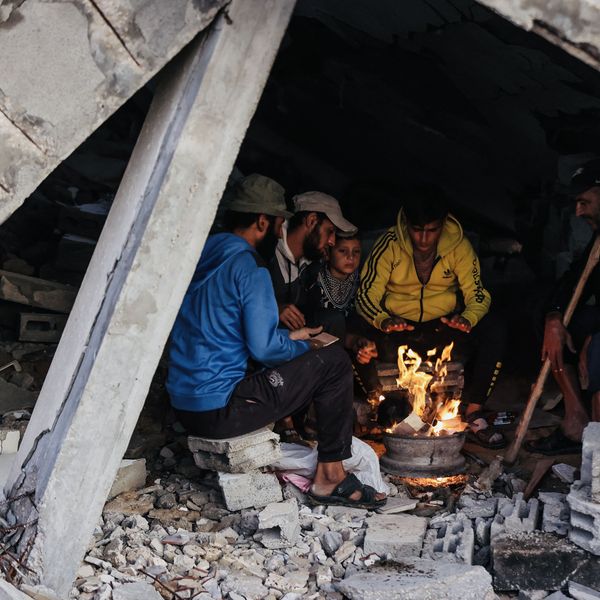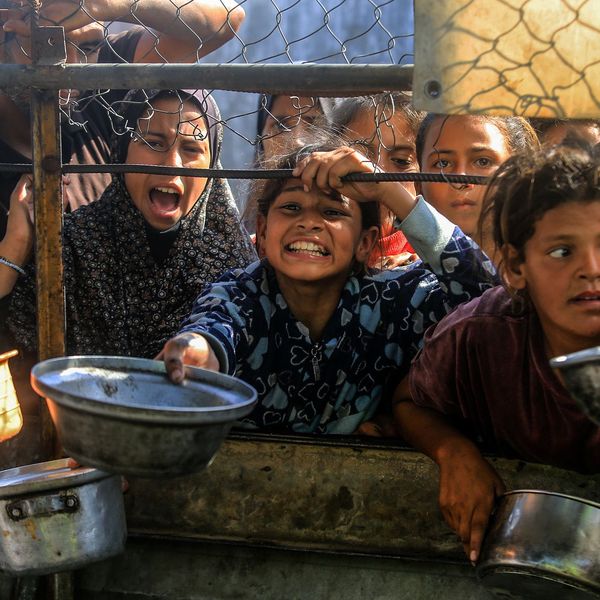From Gaza Right Now
People keep asking me how the situation in Gaza is right now, and I don't know how to begin describing it. Scary. Dangerous. Confusing. So many emotions.
The airstrikes happen everywhere, anytime, day and night. At night is the most difficult time. The bombing intensifies and I can feel it getting closer and closer. I'm exhausted but I try and force myself not to fall asleep... the explosions are even scarier when they wake you up. I prefer to be awake when they strike.
It's Ramadan, the holy month, and we should be celebrating. The "Iftar" meal - at sunset to break the day's fasting - is usually a huge family occasion. My brother's and sister's families would join us, or I'd go to the beach with friends. But this year we spend Iftar on our own, with the sound of explosions and ambulances in the background, phoning relatives to check they are safe. My nine year old niece - named Arwa after me - calls me first thing every morning for reassurance that things will be ok. People keep saying they will be, but you can tell they aren't sure. I call my friends every day and I'm terrified there will be bad news.
During the day we try and work, as much as security allows. Today Oxfam has been distributing food vouchers to families who have had to flee their homes. The needs are growing by the hour - a water system for 70,000 people completely destroyed, a health clinic for pregnant women seriously damaged. The violence goes on and civilians are the ones paying the highest price. I speak regularly with Oxfam's partners - engineers assessing the latest damage; hospitals struggling to cope with all the casualties and shortages of fuel; fishermen who have had their boats destroyed.
The news in Gaza is full of death and destruction
Often we're at home and it's too dangerous to go out - the streets are empty, shops are closed. Time goes so slowly at home... we are constantly watching the news for updates, full of children being killed and homes destroyed. Sometimes I want to turn the news off and watch something else - a drama, a comedy - but I feel guilty. It's the World Cup and the cafes are usually full of men watching the football - now it's too dangerous.
People in Gaza are very resilient. This is the third big military crisis we've been through in six years. I think of children like my niece and I don't want them to get used to this. My sister's children are so frightened. A bomb fell next door to their house, smashing all the windows. Fortunately they were sleeping in the living room because it has only one window, so nobody was hurt. Now they don't want to leave her side, even when she goes to the bathroom.
Peace and justice for the future of our children
Even in between major military escalations, in the "calm" periods, there are still frequent airstrikes and the blockade continues to cripple our lives. It leaves people unable to get jobs, move freely or enjoy a normal life. People in Gaza want to live in peace and justice. We need a long-term solution for Gaza, to give my niece and others the better future they deserve.
An Urgent Message From Our Co-Founder
Dear Common Dreams reader, The U.S. is on a fast track to authoritarianism like nothing I've ever seen. Meanwhile, corporate news outlets are utterly capitulating to Trump, twisting their coverage to avoid drawing his ire while lining up to stuff cash in his pockets. That's why I believe that Common Dreams is doing the best and most consequential reporting that we've ever done. Our small but mighty team is a progressive reporting powerhouse, covering the news every day that the corporate media never will. Our mission has always been simple: To inform. To inspire. And to ignite change for the common good. Now here's the key piece that I want all our readers to understand: None of this would be possible without your financial support. That's not just some fundraising cliche. It's the absolute and literal truth. We don't accept corporate advertising and never will. We don't have a paywall because we don't think people should be blocked from critical news based on their ability to pay. Everything we do is funded by the donations of readers like you. Will you donate now to help power the nonprofit, independent reporting of Common Dreams? Thank you for being a vital member of our community. Together, we can keep independent journalism alive when it’s needed most. - Craig Brown, Co-founder |
People keep asking me how the situation in Gaza is right now, and I don't know how to begin describing it. Scary. Dangerous. Confusing. So many emotions.
The airstrikes happen everywhere, anytime, day and night. At night is the most difficult time. The bombing intensifies and I can feel it getting closer and closer. I'm exhausted but I try and force myself not to fall asleep... the explosions are even scarier when they wake you up. I prefer to be awake when they strike.
It's Ramadan, the holy month, and we should be celebrating. The "Iftar" meal - at sunset to break the day's fasting - is usually a huge family occasion. My brother's and sister's families would join us, or I'd go to the beach with friends. But this year we spend Iftar on our own, with the sound of explosions and ambulances in the background, phoning relatives to check they are safe. My nine year old niece - named Arwa after me - calls me first thing every morning for reassurance that things will be ok. People keep saying they will be, but you can tell they aren't sure. I call my friends every day and I'm terrified there will be bad news.
During the day we try and work, as much as security allows. Today Oxfam has been distributing food vouchers to families who have had to flee their homes. The needs are growing by the hour - a water system for 70,000 people completely destroyed, a health clinic for pregnant women seriously damaged. The violence goes on and civilians are the ones paying the highest price. I speak regularly with Oxfam's partners - engineers assessing the latest damage; hospitals struggling to cope with all the casualties and shortages of fuel; fishermen who have had their boats destroyed.
The news in Gaza is full of death and destruction
Often we're at home and it's too dangerous to go out - the streets are empty, shops are closed. Time goes so slowly at home... we are constantly watching the news for updates, full of children being killed and homes destroyed. Sometimes I want to turn the news off and watch something else - a drama, a comedy - but I feel guilty. It's the World Cup and the cafes are usually full of men watching the football - now it's too dangerous.
People in Gaza are very resilient. This is the third big military crisis we've been through in six years. I think of children like my niece and I don't want them to get used to this. My sister's children are so frightened. A bomb fell next door to their house, smashing all the windows. Fortunately they were sleeping in the living room because it has only one window, so nobody was hurt. Now they don't want to leave her side, even when she goes to the bathroom.
Peace and justice for the future of our children
Even in between major military escalations, in the "calm" periods, there are still frequent airstrikes and the blockade continues to cripple our lives. It leaves people unable to get jobs, move freely or enjoy a normal life. People in Gaza want to live in peace and justice. We need a long-term solution for Gaza, to give my niece and others the better future they deserve.
People keep asking me how the situation in Gaza is right now, and I don't know how to begin describing it. Scary. Dangerous. Confusing. So many emotions.
The airstrikes happen everywhere, anytime, day and night. At night is the most difficult time. The bombing intensifies and I can feel it getting closer and closer. I'm exhausted but I try and force myself not to fall asleep... the explosions are even scarier when they wake you up. I prefer to be awake when they strike.
It's Ramadan, the holy month, and we should be celebrating. The "Iftar" meal - at sunset to break the day's fasting - is usually a huge family occasion. My brother's and sister's families would join us, or I'd go to the beach with friends. But this year we spend Iftar on our own, with the sound of explosions and ambulances in the background, phoning relatives to check they are safe. My nine year old niece - named Arwa after me - calls me first thing every morning for reassurance that things will be ok. People keep saying they will be, but you can tell they aren't sure. I call my friends every day and I'm terrified there will be bad news.
During the day we try and work, as much as security allows. Today Oxfam has been distributing food vouchers to families who have had to flee their homes. The needs are growing by the hour - a water system for 70,000 people completely destroyed, a health clinic for pregnant women seriously damaged. The violence goes on and civilians are the ones paying the highest price. I speak regularly with Oxfam's partners - engineers assessing the latest damage; hospitals struggling to cope with all the casualties and shortages of fuel; fishermen who have had their boats destroyed.
The news in Gaza is full of death and destruction
Often we're at home and it's too dangerous to go out - the streets are empty, shops are closed. Time goes so slowly at home... we are constantly watching the news for updates, full of children being killed and homes destroyed. Sometimes I want to turn the news off and watch something else - a drama, a comedy - but I feel guilty. It's the World Cup and the cafes are usually full of men watching the football - now it's too dangerous.
People in Gaza are very resilient. This is the third big military crisis we've been through in six years. I think of children like my niece and I don't want them to get used to this. My sister's children are so frightened. A bomb fell next door to their house, smashing all the windows. Fortunately they were sleeping in the living room because it has only one window, so nobody was hurt. Now they don't want to leave her side, even when she goes to the bathroom.
Peace and justice for the future of our children
Even in between major military escalations, in the "calm" periods, there are still frequent airstrikes and the blockade continues to cripple our lives. It leaves people unable to get jobs, move freely or enjoy a normal life. People in Gaza want to live in peace and justice. We need a long-term solution for Gaza, to give my niece and others the better future they deserve.

